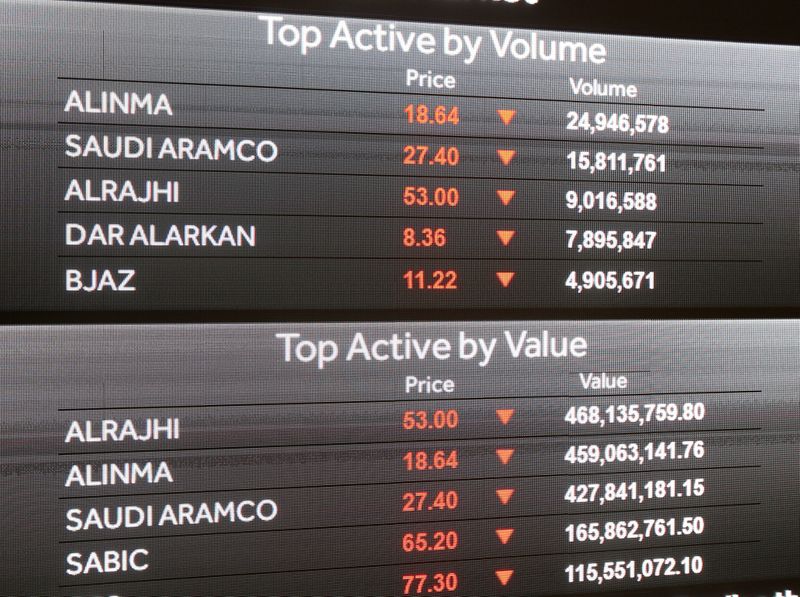By Yousef Saba and Saeed Azhar
DUBAI (Reuters) - Saudi Aramco (SE:2222) shares fell by as much as 10% on Monday, dropping below their December listing price after Saudi Arabia and Russia said they would raise oil production in a battle for market share, sending crude prices down by a third.
Government bonds from Saudi Arabia and other Gulf oil producing countries were also pummeled after the collapse of the deal between OPEC, Russia and other oil producers that had propped up oil prices since 2016.
Aramco shares fell below their 32 riyals initial public offering price on Sunday for the first time since trading began in December. The Aramco listing was considered the culmination of Crown Prince Mohammed bin Salman's efforts to diversify the Saudi economy. The December IPO valued the company at $1.7 trillion in the world's biggest share offering.
Since then oil prices and oil companies' shares have come under pressure from fears over the impact of the coronavirus on oil demand and Russia's refusal to support deeper output cuts to bolster prices. As a result, the Organization of the Petroleum Exporting Countries has removed all limits on its own production.
Aramco shares closed at 28.35 riyals ($7.55), 11.4% below its IPO price. The shares closed 5.5% lower.
Benchmark Brent (LCOc1) crude fell by up to a third on Monday after Saudi Arabia, the world's lowest cost producer, said it would increase output to gain market share.
"The Saudi reaction to the breakdown (with Russia) was to revert to the 2014 playbook. By precipitating an oil price collapse, they are looking to end their subsidy of higher cost producers," Akber Khan, head of asset management at Al Rayan Investment, said.
"This is a painful strategy that requires time to play out and failed on the previous attempt."
Arqaam Capital cut its Aramco rating to "hold" on Monday, citing the company's exposure to the oil price cut and the impact on its 2020 earnings. It also lowered its target price to 30.80 riyals a share from a previous 39.20 riyals.
Saudi stocks also fell by 7.8%, while international bonds issued by Saudi Arabia, Aramco and other Gulf sovereigns also sank.
DEBT MARKET TURMOIL
The cost of insuring against a potential debt default by Saudi Arabia also spiked by nearly 70% on Monday, IHS Markit data showed after oil prices plunged.
Aramco bonds due in 2049 were nearly 9 cents lower and the state oil giant's bonds due in 2029 fell 4.5 cents.
Saudi government bonds maturing in 2049 dropped by more than 9 cents, while 2029 bonds dropped 3.5 cents.
One-year dollar/riyal forwards, which are trades scheduled to take place a year from now, were at 85 points, up from Friday's close of 10 points. They were as high as 182.5 points on Monday, surpassing a peak of 181.3 at the end of 2018.
The bearish mood spread to other Gulf states, with Omani bonds maturing in 2048 down 7.6 cents, Abu Dhabi 2047 paper down 3.4 cents and Bahraini notes due in 2047 5 cents lower.
A regional fund manager, who asked not to be named, said it was difficult to estimate the extent of the price fall (in Gulf government bonds) following the tension between OPEC, led by Saudi Arabia, and Russia.
"(Saudi Arabia) has got reserves for the time being, but at $30 a barrel, it's going to be running a significant fiscal deficit in 2020 and going forward. It doesn't have a lot of financial flexibility in terms of adjusting its budget," he said.
If Saudi Arabia tapped the debt markets, he said it would likely pay around 60 basis points higher in interest as credit default swaps rose by that level on Monday.
